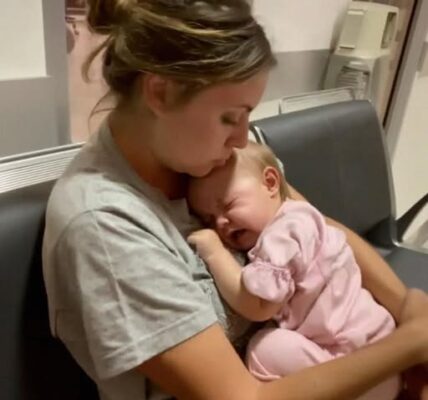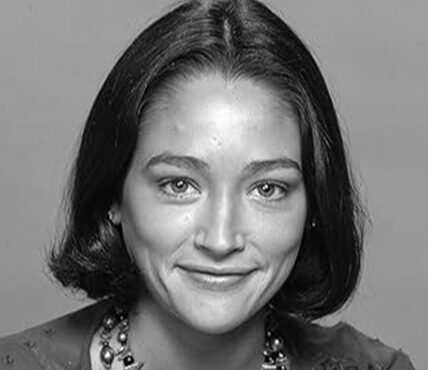I’ve been in the army long enough to know that not everyone can be saved. That doesn’t make things easier, though.
Mindy called me from home. Her voice was calm and soft. “John, they told me the little girl’s whole family is gone.”
I knew already. I was there when she was brought in. She was only six years old, wrapped in bloody blankets, and crying out from cuts I don’t want to talk about. When the rebels tore through her town, they meant to kill her too. But they failed.
At least her body was getting better. Even though the nurses tried their best, the crying never stopped. She was moaning in her sleep and woke up shaking. She felt no warmth. Nothin’ but me.
I have no idea why. It could have been the outfit or the way I spoke. I might have made her think of someone. I only know that she reached for me when I sat down next to her.
I stayed because of that.
I sat by her bed and held her little hand every free moment I had in that hospital. I let her hold on to me because she wouldn’t let go. It didn’t matter that I told her stories in a language she didn’t fully understand. My voice made her feel better.
I almost didn’t go one night after a long shift. I was worn out and puffed up. But I heard her cries as soon as I walked into the hospital room. The kind that went right through your chest.
She reached out as soon as she saw me. She was quiet when I picked her up and put her little body against my chest. That’s it.
The nurses just looked. “She only sleeps when you’re here,” one of them said in a whisper.
I looked down at the girl. Her breath was finally calm, and her little fingers were on my arm.
And I felt something change inside me for the first time in my 26 years of work.
After that, the next few days were a blur of rounds and tasks. Even though I had to make supply runs, answer important calls in the field, and update mission reports, I still found time to check on her. I would ask a woman from the area named Rabia to speak softly to the child and try to get her name. The girl looked at Rabia with wide eyes at first and didn’t say anything. She did manage to say something in the end, though. Rabab looked at me with tears in her eyes.
“She says her name is Yasmina.”
Yasmina. A soft name, like a small flower trying to grow in the middle of a fight. I sat down next to her and tried to say it, but my accent made it hard. Still, her face lit up for a moment when she heard her own name in my voice. It was just long enough to give me a little hope.
I talked to Mindy back home on video call when my shift was over that night. Mindy wasn’t just someone I knew; we were engaged. We set a date and began making plans before this mission. But right now it felt like all of that was happening in a different world. I told her about Yasmina and how scared she was of strangers and how little she slept when I wasn’t in the room.
Mindy told John, “You’ve always had a big heart.” “But watch out.” You still have work to do. I do not want you to lose yourself in this.
I understood what she meant. I had seen it happen before: troops who got too attached and thought they could fix a problem by themselves that they hadn’t caused. But I couldn’t help but stand back when it came to Yasmina. I went to the hospital during my lunch break the next day after that call. She was sitting up in bed with a small toy animal on her lap. Someone must have brought it for her. It looked like the stuffing might fall out at any time because she held on to it so tightly.
It was a gentle touch, and she looked at my hand. Then she picked up the bear and put it in my hand like it was a gift. She put it firmly against my chest and smiled shyly when I tried to give it back. Her eyes filled with tears after just one heartbeat of a smile. She was telling me that she didn’t have anything or anyone. That little bear, which was a gift from a kind nurse, was all she had, but she gave it to me anyway.
There was a lump in my throat. I carefully gave it back. I said, “Keep it,” first in a bit of the local language I knew and then in English. “Take it.” You can have it.
In bits and pieces, we learned more about what was going on with Yasmina. It was impossible to find any live relatives. All of her parents, grandparents, and brothers are dead. The town was far away and constantly at odds with itself. There was no steady shelter in the area, and there was no real way to help orphans. At night, I found myself awake and wondering, “What will happen when I leave this country?” Where is she going?
At that point, Rabia came up to me with a possible tip. Someone from her family might have run away across the line, she said. He had settled down in a small group of refugees. She warned, “It’s not for sure, but I’ve heard rumors.”
A small spark of hope. We might not have to put Yasmina through a state-run school to grow up if we could find him. She might be able to get a piece of her family, her past, or a language she could understand. So I asked around. I asked my boss if there were any tools we could use to help find refugees. It took days, but we finally learned that a man named Hakim—who might be related—had ended up in a big refugee camp.
I should have been thrilled. The man didn’t have a permanent home, and the camp was in a restricted area that was off our normal route. It was hard to get permissions. If I could go, it might take weeks to be sure that he was really the same Hakim and that he was connected to Yasmina. As the days went by, I could see that the hospital staff was getting ready to move Yasmina from the emergency room to a longer-term room. I had no idea where that center would be, but I did know it would be far away from me.
After a few nights, I was sitting on the edge of Yasmina’s bed when a nurse tapped me on the shoulder. “They’re moving her tomorrow,” she said in a low voice. It broke my heart. For some reason, hearing it out loud hurt more than I could explain.
I stayed up late that night with Yasmina and held her hand while the lights above us flickered from the generator. A few English words were starting to stick with her, mostly from hearing me talk. In a soft, uncertain voice, she said them again. “Cloud… star… night,” she said in a low voice, pointing out the window at the dark.
I replied in a whisper, “Yes, star.” “What a beautiful star.” She smiled, and then she fell asleep. Sometimes I wished that time would stop right there, between her and me—her a lost child and a tired soldier—away from the chaos outside those thin hospital walls.
When the doctors came to move her the next morning, she wouldn’t stop crying. She clung to me and couldn’t stop crying. The tent was filled with her screams. I did everything I could think of, like mumbling soothing words and trying to gently pull her hands away from mine. I also promised to come see her soon. But she was unable to calm down. I finally got to ride with the head nurse to the next town, just to calm her down.
As we went over bumpy roads and saw empty fields and houses that were falling apart, I saw fear and hope in Yasmina’s eyes. She thought I had the power to do something and make things better. I really didn’t know how.
The people in charge at the new building seemed nice, but it was very busy. Supplies were low, and the staff was overworked. I saw some kids huddled together on mats in a small corner while I was doing papers. Some had lost limbs, and others had bandages on new cuts. My chest got tight. I had seen a lot of horrible things in my life, but seeing these kids in pain was enough to make me question why I had ever worn a uniform.
I still wouldn’t give up. I begged my senior officer one more time that afternoon. I told them everything, including about Yasmina and the chance that there was a family member. I said I might be going too far. What do you know? I was able to talk to him. He said, “Let me see what I can do.” “John, you’ve done a great job here. “If there’s any room for error, I’ll find it.”
After a week, he pulled some strings, and I was able to go to the refugee camp on a day off. Rabia offered to come and help with the translation. A driver from the area agreed to take us. We spent hours driving on dusty roads in the hot sun until we reached the camp’s edges. There were rows of torn tents and homemade huts, and people were waiting in line for food and water. My heart was beating fast the whole time. What would happen if Hakim wasn’t here? Otherwise, what if he wasn’t really related?
We looked through row after row of shelters until we found him. He looked older than I thought he was. His hair was salt and pepper, and his eyes were tired. He was confused at first because he didn’t trust two strangers in uniform. But Rabia told them who I was and why we were there. He got teary-eyed when he heard Yasmina’s story. He rasped, “She’s my niece,” and put his hand on his chest.
I felt like a wave of relief hit me. But there was still a catch: Hakim didn’t have any money or a safe place to live. In that camp, he couldn’t take care of Yasmina. Even though he wanted to, he couldn’t put a child who had been through a lot of stress in such bad conditions. I slouched my shoulders. It seemed like everything we did was for nothing for a moment.
After that, he looked at me and said something that Rabia had to interpret. “If you can make her life better… That is what I want for her.
After that, the days were filled with calls, meetings, and work. Mindy and I talked a lot, and every time, her voice was steady and encouraging. She told him, “If you feel called to do this, John, we’ll find a way.”
Adopting a child was never something I thought I’d do at my age. Even less so from a war-torn country while I’m on assignment. But it was clear that I was the only one who could really help Yasmina move forward. I was scared of the court process, and I knew it wouldn’t happen right away. I knew I had to try, though.
For months, they had to deal with red tape, background checks, and working together with both local authorities and officials back home. I went to see Yasmina every chance I got during that time and watched her get better. Her bruises started to go away, and she started to laugh again slowly. She laughed every time I showed her pictures of Mindy or our small house in our city, which was nice and had a big yard.
I told her, “I’ll be there soon to get you,” but I wasn’t sure when. She would nod and hold my hand still. I learned a little more of her language every day, and she tried to speak English more. She would smile and point at me and say, “John, my friend.” When I thought about how I’d first seen her in that bloody blanket, I’d smile while holding back tears.
My tour was over in the end, and I went home. I had never felt so bad about leaving Yasmina behind. But I had to go back to the US to finish everything up. Finally, early one morning, after what seemed like forever, I got the call: the adoption had been granted.
I flew back to another country, feeling both excited and scared. What if she forgot about me? What if she found this change too abrupt? But as I walked through the hospital patio, she saw me from the other side and ran right into my arms. She held on tight to me like I was her only way out. At that very moment, I knew we were on our way home.
She is safe today with Mindy and me. Sometimes she still has bad dreams, and we’re learning how to help her get better. But she finds happiness in little things, like planting flowers in our garden, coloring pictures of a sky full of stars, and showing off her stuffed bear to everyone who comes over.
Now that I think about it, I know that you can’t save everyone. The world is broken in so many ways. But saving just one person is more important than words can say. It’s just enough to make a small way through the darkness. So, who knows? That one act of kindness might have effects you couldn’t have thought.
Thanks for reading all the way to this point. Please remember that even a small act of kindness can mean a lot to someone who has lost a lot. There are times when all it takes is a steady hand, an open heart, and the will to be there, even if you’re tired or afraid of getting hurt.
This story may have touched your heart. Please share it with someone who needs some hope today. If you like this post, please share it with others to show them that even in the worst times, good things can happen. No one is too little or too lost to be loved, after all.


